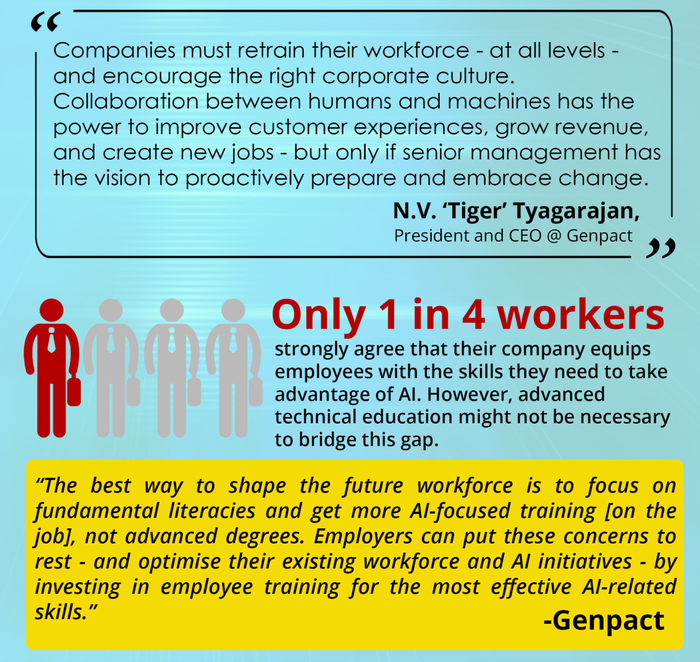The Dawn of AI Coworkers; The End Of Office Drones
September 26, 2018

By Charles Towers-Clark
LONDON - Artificial intelligence will take your job. More specifically, narrow AI (programmes that excel at a specific task) will soon be able to handle any part of a job that can be made into a process and do it 100x faster than you. The justified reaction to this is fear - ‘how am I going to find a new job with the skills I already have?’ - but relying on one particular set of skills is already the wrong way to go.
Thanks to the ability of AI to tackle mundane tasks, we have a great opportunity to advance to the next stage of human development, but if we are not prepared it could just as easily lay waste to employment as we know it. We need to change the way we think of work if we want to keep earning a living, and the way to do that is to be more human, not to try and compete with the literal office drone of the future.
Artificial intimidation
Artificial General Intelligence (AGI) portrayed in the guise of Hal-9000 or I, Robot is a long way off, but advances in narrow AI are already integrated with society. How often do you rely on Amazon suggestions or Google Translate? These AI programs can compute virtually anything we tell them to, and the ability to complete the same tasks day-in day-out will very soon become obsolete - no matter if that task is building custom insurance policies or preparing a legal case for trial.
Where narrow AI falls down is in applying knowledge to the real world (Google Translate can’t help you with any parts of language that aren’t digitised) or using acquired knowledge on any task that it hasn’t been specifically programmed to do - like learning to play poker instead of Go. This means that, while a combination of these programmes will be able to handle a multitude of tasks, the parts in-between will need a human touch - such as arguing a case in court, or sensitively handling an irate customer whose claim has not been accepted (or accepting a claim under extraordinary circumstances).
 Related: 5 Ways AI Will Change The Future Of Work In 2018
Related: 5 Ways AI Will Change The Future Of Work In 2018
‘That’s not my job’
The vast majority of organisations encourage a ‘specialise and segregate’ mentality, i.e. ‘that’s not my job, and I won’t do anything that’s not on my to-do list’, mainly because this has been the dominant working paradigm since the first industrial revolution. With AI soon able to complete any process-driven task, our to-do lists will be much shorter and less focused on mindless tasks.
Instead, humans will have to build on our least tangible and quantifiable skills to manage our AI coworkers, and guide their machinations within the grand scheme of things. To do this, we need to drastically change organisational structures, to prepare the current and future workforce for a new way of working. The traditional hierarchical way of working clearly won’t work for us once AI is able to fill the bottom half of the pyramid 100x better than we can. But how do you prepare workers for becoming managers of a team of robots?
WEIRDer than average
At our company, Pod Group, we came up with a strategy that emphasizes our most human attributes, to help build on those skills that AI can’t compute. Our WEIRD framework promotes Wisdom, Emotional Intelligence, Initiative, Responsibility and Development (WEIRD), with the aim of allowing everyone to feel responsible and confident about their actions as owners of the company.
Oddly enough, if you treat people like adults who are good at their work, they actually want to do it. People can choose where they work, and when to take a holiday, and all information about the company is completely transparent - including salaries decided by each person - so everyone can know the costs and returns of any project. This way everyone feels respected and satisfied at work and can see how every process fits together to benefit the company.
Once a culture of responsibility and big-picture thinking is fostered as part of a company’s core structure, the potential of each employee can shine through and our human abilities can be used to make the most out of AI.
‘How can I help you, human?’
As the ultimate productivity tool, disruptor, and incentive to better ourselves, AI will change the current working paradigm more than any other revolutionary technology before it. We will not simply slot into new jobs based on existing specialisms, because all specialist jobs will be automated. Instead a wealth of new jobs will come from our human ability to adapt based on changing conditions, to react to entirely new situations appropriately, and to understand how fixed AI processes impact the wider world.
In the near future, AI will be the driving force behind a new era of sustained innovation - if we prepare our organisations properly, we will be the ones steering it in the right direction.

Charles Towers-Clark founded Pod Group in 1999, and helped build the company into a specialist billing software and IoT connectivity provider. Charles’ upcoming book ‘The WEIRD CEO; will discuss the impact of AI on the future of work and the need to change the way we think about work to cope with this changing world.
About the Author(s)
You May Also Like


.jpg?width=700&auto=webp&quality=80&disable=upscale)
.jpg?width=700&auto=webp&quality=80&disable=upscale)
.jpg?width=700&auto=webp&quality=80&disable=upscale)
.jpg?width=300&auto=webp&quality=80&disable=upscale)
.jpg?width=300&auto=webp&quality=80&disable=upscale)
.jpg?width=300&auto=webp&quality=80&disable=upscale)

